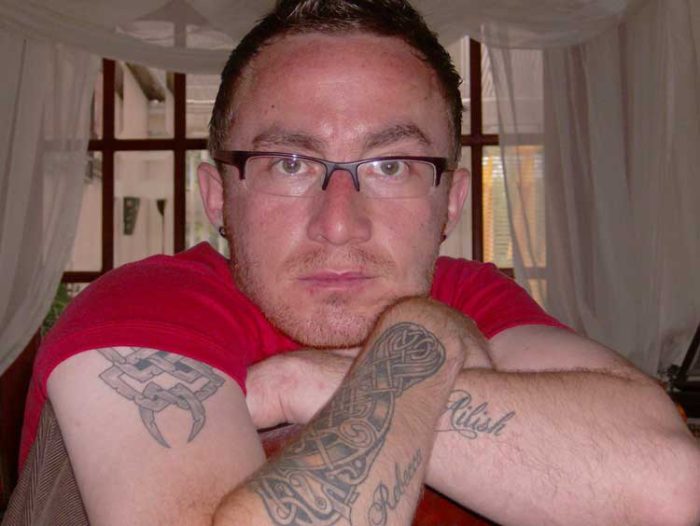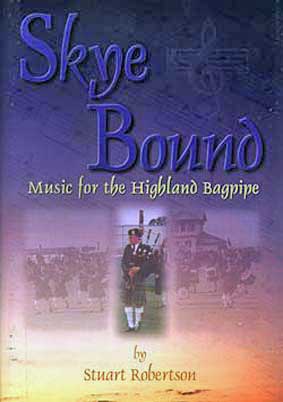Stuart Robertson
(1973 - )
 I was born in 1973 in the town of Munster, Germany. My father was in the armed forces and we lived in Germany, Hong Kong and England before moving to Scotland when I was 5.
I was born in 1973 in the town of Munster, Germany. My father was in the armed forces and we lived in Germany, Hong Kong and England before moving to Scotland when I was 5.
My Great grandfather was the only piper we are aware of in the family. He was was a native of the isle of Arran, as were all of my father’s people.
I started my piping career at the age of 11 with my local band, the Burgh of Ardrossan Pipe Band. My tutor was P/M Willie Crawford, who was regarded as one of the finest tutors in the North Ayrshire area. I was entered into numerous solo practice chanter events, and was very successful – lots of medals and trophies from that time!
Progressing from the chanter to the pipes took about a year; Willie was of the view that you had to master the embellishments and at least one full tune (mine was “The Battle of Killiekrankie”) before being allowed to play the full bagpipe. Upon reaching that goal, I quickly increased my repertoire and I remember Willie telling my father, “That boy eats music!” I spent 3 years learning, playing and being moulded to the point where I was ready to move on and further my piping education.
At 14, I moved up to a Grade 3 competing band and quickly picked up my first experience of band craft. Under the direction of P/M Iain McDowall, the band was highly successful in its grade. I was encouraged toward the solo side of things as much as the band side, and was as successful in the piping as on the chanter. I was Ayrshire, Dumfries & Galloway Solo Piping Champion in the Juvenile Section, and won numerous prizes at that level. By age 18, I had composed my first few tunes, havig taught myself how to compose and write music. My very first tune had 9 bars in the first line! But as time went on I began to understand better, and I wrote every other day. I realised that the music I enjoyed could not be performed on a solo pipe, and I began to compete in solos less and less, my last contest being at Cowal, where a bass drone reed had fallen into my sheepskin bag 10 minutes before I stepped onto the boards. Needless to say, the drone stopped halfway through the strathspey and my solo career was over with a whimper!
By this point I had met a girl who had joined the band, and was to become my wife several years later. At age 19, it was time to move on to a fresh challenge, and though I had a few Grade 1 bands knocking on my door, we decided we would both move to the newly promoted Torphichen & Bathgate Pipe Band under P/M Gordon Stafford and taste life in Grade 1. I was composing pretty much a tune a week at this point, most being pretty average. The band was moderately successful in its first year and began to use a few of my tunes in the competition medley. Sadly, the band collapsed, and along with Gordon Stafford and a few others I moved to Polkemmet Pipe Band under P/M Steven Young. I had a vast amount of tunes composed by this point, and had my first published in the old Piping Worldmagazine. I competed with the band in Grade 1 for a few seasons and then with some nagging from a good friend in the Glasgow Skye Association Pipe Band, I opted for that band, which was closer to home.
 P/M Iain Roddick was keen to use a few tunes I had brought in, and I soon found a platform where I could experiment with harmony and ensemble. It seemed whatever tune I presented to him, it was “That’s a cracker, we’ll use it!”
P/M Iain Roddick was keen to use a few tunes I had brought in, and I soon found a platform where I could experiment with harmony and ensemble. It seemed whatever tune I presented to him, it was “That’s a cracker, we’ll use it!”
At this point, Geoff Irvine, a piper and good friend from South Africa who I had met in my Polkemmet days, suggested putting a book together. I thought long and hard, and with the assistance of my good friend P/M Fraser Dallas (East Kilbride Pipe Band), we set about the project with great enthusiasm. We included works from Steven Kirkpatrick (FMM) and Ryan Canning (FMM), and my book was the first publication to feature Ryan’s “The Full Monty.” The book was entitled Skye Bound, and was released in August 2000 at the pre-Worlds Millennium Concert run by The Glasgow Skye band. The book received a great review from P/M Ed Neigh in the Piper and Drummer magazine, and was distributed by the College of Piping in Glasgow.
The following season, I had the pleasure of walking around the games and hearing my music being played by bands from all over. It’s the greatest compliment to a composer of any music to hear another musician play his or her compositions. P/M Iain Roddick retired that year, so we decided to move again. My wife had given birth to our first daughter, and I wanted to reduce my commitment level. P/M Kenny McLeod had asked me over to the Kilmarnock Pipe Band as Pipe Sergeant, where he had recruited several former Glasgow Skye members from his time as P/M there. The band competed in Grade 2, and again, I was asked to provide some material and arrangements. Through work commitments, Kenny decided it would be better for the band if he were to step down, and find a P/M who could commit more time. I was offered the job, but at the same time P/M Don Bradford had asked me up to the David Urquhart Travel Band he had recently taken over. I had met Don a few years previous, and was keen to learn from someone I had such huge respect for, both as a P/M and composer, so I jumped at the opportunity.
I learned a great deal about band craft and music from Don, and was amazed by the music he produced. At the same time, I was listening to my music being played by numerous pipe bands across the world, and by folk groups and ceilidh bands on Robbie Shepherd’s BBC radio Scotland programs. The Wicked Tinkers folk group from California put one of my tunes on their Loud album. The David Urquhart Travel band was being noticed on the field, and the 2003 season brought a first place in piping in the medley event at the World Championships. The band finished 8th equal with Scottish Power.
But the end of the season brought huge disruption, and the outcome was a total split. The pipe corps became The Glasgow Pipes and Drums, and recruited L/D Gary Corkin and his corps. By this time, P/M Gordon Stafford had been in contact, looking to reform the Torphichen Band again. I decided to head back up the M8 once again, and was appointed P/S. I had a heavy influence in the ensemble effects and arrangements of any music the band played, and in setting up the band. The 2005 season saw the band being placed at every major, including being crowned British Champions and coming a close 2nd at the Worlds in Grade 2.
In October of the previous year I had put forward the idea of the band performing a concert to finish off the 2005 season. I set about writing and arranging, and used the talents of Chris Djuritscek, a piper and composer in the band. Chris had a few of his compositions in one of Robert Mathieson’s books, and I could see that his passion for music and composition mirrored my own. We were bouncing new tunes and ideas between us, and during this period I gained a deeper knowledge of music and expanded my horizons, composing outwith the bagpipe scale. I came up with an idea for a suite based on a slow air I had written, and I let Chris hear it. We worked on it for 3 or 4 months while writing other material for the concert and finally settled on an 8-minute version that would incorporate didgeridoo, percussion and jazz kit drumming. It worked well and was a proud moment musically.
I had decided the concert should be recorded, and contacted my friend Murray Blair, who is widely recognised as one of the best in the business at recording pipe bands. I had pretty much organised, written, and arranged the entire concert, the CD artwork and program. It was a huge undertaking, but was a fabulous platform to express my musical tastes and ideas. The CD was released in mid-2006, and received a generous review in thePipes|Drums online publication from Kylie McHattie. The CD featured a solo I had played on the Deger pipe, and a tune I had literally spent 3 minutes composing. I had recorded the entire concert repertoire onto mini-disc with the Deger as a learning aid for the pipers, and after all the recording, I relaxed and just let my mind and fingers wander. The next day, I listened back to the recording and to my surprise; I had recorded a tune based around a hook that had been floating around my head for several days: four parts, straight out, and recorded! “Velocity” or, to give its full name, “Pyroclastic Velocity” was born. The CD contains a good number of my compositions, and arrangements, and is another one of those proud moments in my piping career.
The year 2006 was my last with the Torphichen Band, and I had decided that after many years of avoiding the very top of the tree in favour of up-and-coming outfits, I opted for a move to House of Edgar Shotts & Dykehead Pipe Band under P/M Robert Mathieson. Immediately, Robert picked up on “Velocity” and was keen to develop it for the medley for the 2007 season. He gave my music a platform I had never imagined would be possible. Since then, I have increased my knowledge of music even further, and several of my compositions for both competition medley and concert repertoire have found a place within the band.
There are lots of requests for a second book now. I have been blessed with the help, encouragement and guidance from one of the most prolific composers in modern times in Robert Mathieson. And I still have to pinch myself when he turns to me at a practice and asks for something to be written, or for an idea for a setting of a tune – or even my general opinion on a piece HE has written!
March 2008
